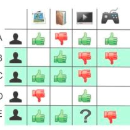Recommender systems may be confounded by various types of confounding factors (also called confounders) that may lead to inaccurate recommendations and sacrificed recommendation performance. Current approaches to solving the problem usually design each specific model for each specific confounder. However, real-world systems may include a huge number of confounders and thus designing each specific model for each specific confounder could be unrealistic. More importantly, except for those ``explicit confounders'' that experts can manually identify and process such as item's position in the ranking list, there are also many ``latent confounders'' that are beyond the imagination of experts. For example, users' rating on a song may depend on their current mood or the current weather, and users' preference on ice creams may depend on the air temperature. Such latent confounders may be unobservable in the recorded training data. To solve the problem, we propose Deconfounded Causal Collaborative Filtering (DCCF). We first frame user behaviors with unobserved confounders into a causal graph, and then we design a front-door adjustment model carefully fused with machine learning to deconfound the influence of unobserved confounders. Experiments on real-world datasets show that our method is able to deconfound unobserved confounders to achieve better recommendation performance.
翻译:暂无翻译




